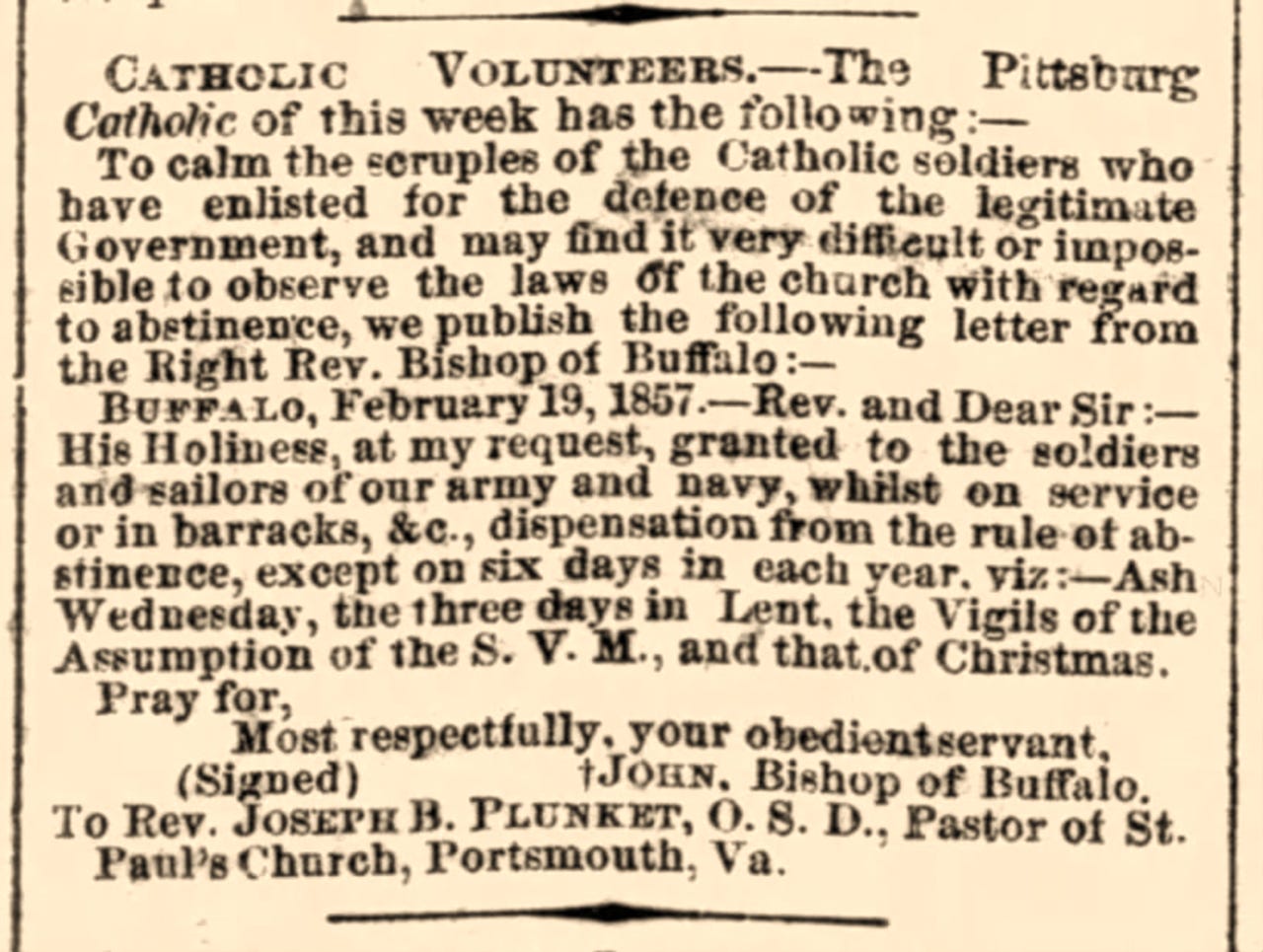Hey everybody,
Today is the last Tuesday of February, and you’re reading The Tuesday Pillar Post.
On the liturgical calendar, today is the feast of St. Gregory of Narek, an Armenian who lived more than 1,000 years ago, and was named a doctor of the Church by Pope Francis in 2015.

Never heard of Gregory of Narek? In the West, you’re not alone. He’s not a guy on our radar, really. But in Armenia, Gregory is a hugely important figure, who is still considered his people’s greatest poet, and their great mystic— a man with the deep soul of the Desert Fathers, the penitence of Augustine, and the hope of St. Francis.
His most famous text is a long, lamenting, mournful offering of “a sighing heart” to Almighty God. The text, called “Lamentations,” is a staple prayer book in the homes of Armenian Christians.
I suspect its dolorous lines of lament have been important to a people as long-suffering as the Armenians:
“The voice of a sighing heart,
Its sob and mournful cries,
I offer up to you, O Seer of Secrets.
I lay the fruits of my wavering mind
as a savory sacrifice on the fire of my grieving soul
to be delivered to you
In the censer of my will.
Compassionate Lord,
Breathe in this offering.
Look more favorably upon it
than upon a more sumptuous sacrifice,
offered with rich smoke.
Please find these simple words acceptable.
Do not turn in disdain.”
…
“Why you have you hardened my miserable heart,
so I do not fear you,
who is beyond words and awe.
Help me, so I will not be unfruitful,
Like the planter vainly sowing seeds into barren ground.
Spare me that I may not
Labor without birth,
Sigh without tears,
Meditate without voice,
Cloud without rain,
Struggle without reaching,
Call without being heard,
Implore without being heeded,
Groan without being comforted,
Beg without being helped,
Smolder without aroma,
See you without being fulfilled.
Hear me, Lord, before I cry out to you,
Who alone are almighty.
Do not leave the wages of my suffering unrecompensed,
For the tallied days of my life of sin,
Wayward soul that I am.”
Gregory, Pope Francis wrote in 2015, “gave voice to the cry, which became a prayer, of a sinful and sorrowful humanity, oppressed by the anguish of its powerlessness, but illuminated by the splendor of God’s love and open to the hope of his salvific intervention, which is capable of transforming all things.”
There is something important to that for all us — there is something important to brining to the Lord our anguish, whatever it is, in confidence that he alone can transform it.
“Lord, you are goodness beyond telling,
wonder-filled human kindness,
astonishing forgiveness, perplexing forbearance,
unending sweetness, glorious mildness.
You, over whom compassion prevails, but
do not feel restrained.
You are overwhelmed by mercy,
but are not blamed.
You are constrained by human kindness,
but are not disdained.
You are compelled by goodness,
but are not cursed.
You act out of love,
but are not ridiculed.
You seek my return to you,
but do not grow weary.
You run after me in my obstinacy,
but do not give up.
You call out to me though I do not listen,
but do not lose patience.
You rush after me in my sloth and are not stopped.
In the face of my evil, you are good.
In the face of my total indebtedness, you are forgiving.
In the face of my sinfulness, you are indulgent.
In the face of my darkness, you are light.
In the face of my mortality, you are life.”
Readers, if you need a prayer book this Lent, I’m serious — “Lamentations” might be for you.
And if even you have cried out from the depths of sorrow, Gregory of Narek might be your guy.
St. Gregory the Armenian, pray for us.
The news
You might have read already that more than a dozen people were killed on Sunday while attending Mass in Burkina Faso, a landlocked country in West Africa.
You might know they were killed in a terrorist attack, and that other Catholics worshiping with them were also injured by the terrorists.
But when I first read about this, I didn’t know anything else about the state of affairs for Christians in Burkina Faso — what dangers they face, and what might happen next.
So The Pillar’s Luke Coppen took a deep dive into the situation, to bring this explainer:
What happened in Burkina Faso? Why were Christians massacred? And, really, where is Burkina Faso, in the first place?
Read about this sobering attack, right here.
—
You might not know it, but across Europe right now, farmers are protesting the European Union’s Green Deal policy, which they say aims to dramatically reduce agricultural production in the EU.
In Poland, farmers have started blockades, parking combines and tractors wherever they can disrupt daily life, to protest the effect of cheap imported grain on the economy, and on their livelihood.
Now, that might not sound like the kind of thing The Pillar usually covers. But the president Poland’s episcopal conference has been speaking out about the massive protests, urging solidarity with protesting farmers.
And Archbishop Stanisław Gądecki isn’t alone. In a surprising kind of inter-episcopal solidarity, bishops in Poland, France, and Spain have all expressed the Church’s solidarity with farmers, and urged EU reform.
For my money, this is interesting from an ecclesial perspective for a few reasons — one, it points to the preferential agrarian disposition expressed and presupposed in many of the Church’s important Catholic social teaching texts.
Two, bishops in Europe tend to be largely pro-EU. Here, though, they’re siding with farmers, and that’s somewhat unusual. Is that because they perceive injustice on the part of the Brussels bureaucrats, or because they’ve decided to align themselves with the populist wave growing across the European contintent?
Three, this becomes an interesting case regarding the influence of bishops across contemporary Europe.
To anyone who can read a history book, Europe can’t be understood apart from Catholicism. But is there any sense in which that remains true? If Europe’s bishops speak strongly — on an issue unrelated to the third rail of the sexual revolution — is there any chance Brussels will hear them?
I doubt it, of course. They’re on the wrong side of fashionable EU politics. And if I’m right, that’s a good reminder that while its Christian roots are real, there is almost no meaningful sense in which the Church’s leaders can be said to have an influential role in European secular affairs.
It’s important to know that, to take it seriously. Among other things, it means that the Church can better understand and conceive of herself according to her divinely instituted purposes: the worship of God, and the proclamation of the Kingdom.
At any rate, read about Archbishop Gadecki and the EU’s farm protests, right here.
This Pillar Post is brought to you by a Pillar reader who would like to promote the book Ceremonial for Priests. The 2002 General Instruction of the Roman Missal directed that “attention should be paid to what is determined by this General Instruction and the traditional practice of the Roman Rite” (italicized words not in 1975 GIRM). This book provides the missing details for how to celebrate in the traditional manner. Learn more!
One year ago, priests of the Steubenville diocese were in crisis — they argued that their bishop had failed to consult anyone meaningfully about a plan that would see the diocese merged with the neighboring Diocese of Columbus. And many of them argued, in a letter writing and advocacy campaign, that their diocese needed new leadership, not a merger — and that decades of episcopal missteps had created serious problems, but that they were solvable.
Today, many of those priests have a very different perspective. They say that Bishop Paul Bradley, appointed Steubenville’s temporary administrator, has accomplished a major turnaround of morale and outlook.
The prospect of merging is not off the table at all. But Steubenville priests and laity have told The Pillar that they trust Bradley has the best interests at heart — and that that’s made a big difference in their perspective.
“He tells the facts, he discusses them, and he recognizes that people have a right to know things. That none of this should be unveiled to them as a great secret or a great surprise, whatever the result of something is,” one priest told The Pillar.
Steubenville’s most well-known Catholic resident, theologian Scott Hahn, also had praise for Bradley.
“He’s transparent to practically all concerned parties … From the get-go, in all of our conversations, he’s totally available, and also transparent, in a way that I want to be personally — In a way that we need our leaders to be.”
While that turnaround is remarkable, it doesn’t answer the really fundamental questions: Will the Diocese of Steubenville still be merged? When Bradley says the diocese appears viable to him — even financially — will that make a difference?
Read our report from the Ohio Valley, right here.
It was, in some ways, the year without Lent.
And the year without Lent is just one of the fascinating stories about Lent’s recent history. In a great report published yesterday, Pillar researcher Nico Fassino dove deep into some of the norms and practices of Lent in recent centuries.
There’s a lot to learn.
For example, check out these 1878 fasting regulations from the Diocese of Green Bay:
And check out this 1857 military dispensation, which came just ahead of the Civil War:
Or this 1916 St. Patrick’s Day dispensation:
There’s actually much more to learn about the norms, praxis, and dispensations of Lent in recent centuries.
I really urge you to give this a read. It’s great Pillar stuff. And I promise that it won’t be penitential!
De GUSTObus
At about three in the morning this past Saturday, 125,000 feet above Antarctica’s icy plains, a remarkable feat of human engineering set a record. No one was there to cheer, there was no fanfare.
Around the globe, only a handful of people celebrated, but the feat is worth celebrating. High above Antarctica’s Long Duration Balloon Camp, a balloon the size of a football stadium set a record — it had been aloft for 55 days, one hour and 35 minutes, longer than any of NASA’s heavy, long duration balloons.
The balloon, GUSTO, shows no signs of coming down. It’s carrying a telescope mapping the Milky Way, charting the cosmic material between the stars.
This is very cool. You can read more about it from NASA, right here.
—
But if you prefer to read about orbs floating somewhat closer to earth, please let me commend to you a very cool report which might have bounced right past you last week — a breakdown of the surprisingly unregulated jump ball, the basketball feature with very few rules, and, still, a good deal of cheating.
Find out why referees say Shaquille O’Neal might have been the sneakiest jump-baller in basketball history, and take a look at some goofy jump ball releases from NBA refs.
Like this one:
—
I also found interesting reading this week the NY Times interview Friday with a therapist and author who is also a diagnosed sociopath.
Now, most of us are unfamiliar with sociopathy, and “sociopath” is mostly just a term we use to describe an out-of-control boss or strange colleague, or maybe the neighbor who is fanatical about how to line up garbage cans at the curb on trash day.
But sociopathy is a real diagnosis, and it’s rare to hear someone describe the experience of it. I can’t endorse the memoir; I haven’t read it. But I found the interview an interesting glimpse into an unusual psychological reality.
—
And speaking of the NY Times, if you haven’t read Adam Rubenstein’s account this week of being a conservative at the op-ed pages of the Grey Lady, you really should. It’s paywalled, but if you’ve already met your article threshold at The Atlantic this month, you might be able to skirt the paywall by reading it in an “incognito” browser.
—
And if none of those tickle your fancy, allow me to share with you this morning the most interesting corner of Reddit I’ve happened upon in quite some time:
Now, you might imagine that Dishwasher Reddit is a corner of the Reddit social media ecosystem where people go when they have questions about the repair or function of their home appliances. You’d not be alone in thinking that, in fact, I stumbled upon Dishwasher Reddit when trying to understand how better to repair a spray arm of my own dishwasher.
Dishwasher Reddit isn’t that.
It is instead the online gathering space for the people who wash your dishes, and pots and pans, and forks and spoons, at any restaurant where you eat.
And hanging out in Dishwasher Reddit means listening in to people who have perfected, or are perfecting, a mostly unnoticed and rarely considered craft — even as chefs become celebrities, and every new television program is a competition in which those chefs try to make cakes look like objects — dishwashers have not yet come into the spotlight.
But their work, and conversation, is fascinating. In Dishwasher Reddit, you’ll learn how the top dishwashers organize their “dish pits,” budget their time, and keep their hands from cracking and splitting under the strain of harsh cleaning chemicals.
(Most dishwashers, I learned, don’t wear gloves while working, because the moisture inside is worse on their skin than plunging barehanded into scalding hot chemically-laden water. Who knew?)
Dishwasher Reddit also features a kind of video and photo set I like, in which working dishwashers document appliances breaking in real time in their kitchens, bemoan the disorganization of servers and bussers, or boast about their spotless dish pits at the end of long shifts.
In the best posts, veteran dishwashers encourage newbies to stick with it, to keep working an often thankless job, to keep chasing the mystical “flow” some dishwashers say they experience as they wash in a well-organized and well-run dish pit.
Some even warn newbies not to use drugs at work, because the experience of optimal dish flow is a better high, they say.
Really, Dishwasher Reddit is cool. I’m not suggesting you waste lots of time on it, but if you’re going to spend time on the internet today not doing your job, consider this place.
If nothing else, the thread on the mystery of this “sink pizza” is worth reading:
—
We’ll have a lot more news coming your way this week. If you can, please subscribe. We need your help to keep The Pillar going. Seriously.
In the meantime, please be assured of our prayers. And please pray for us, we need it.
Here’s a prayer from St. Gregory:
“He did not suffer on the cross for Satan,
but for me he is continuously sacrificed.
Satan does not partake in life,
but I am eternally favored with salvation.
Satan is not protected by the cross,
but I am fortified by this sign.
He is banished from the light,
but I am joined with glory.
God did not promise him peace even on earth,
but he made me an owner of heaven.
God cut off his guarantee of hope,
but continued mine forever.
God confined him to a herd of pigs,
but in me God dwells more firmly.
God compared him to a scorpion,
and he called me the light of the world.
God made him resemble a snake,
but he placed the seal of his name upon me.”
He has placed the seal of his name upon us. Thanks be to God.
In Christ,
JD Flynn
editor-in-chief
The Pillar
This Pillar Post is brought to you by a Pillar reader who would like to promote the book Ceremonial for Priests. The 2002 General Instruction of the Roman Missal directed that “attention should be paid to what is determined by this General Instruction and the traditional practice of the Roman Rite” (italicized words not in 1975 GIRM). This book provides the missing details for how to celebrate in the traditional manner. Learn more!
Comments 19
Services Marketplace – Listings, Bookings & Reviews















